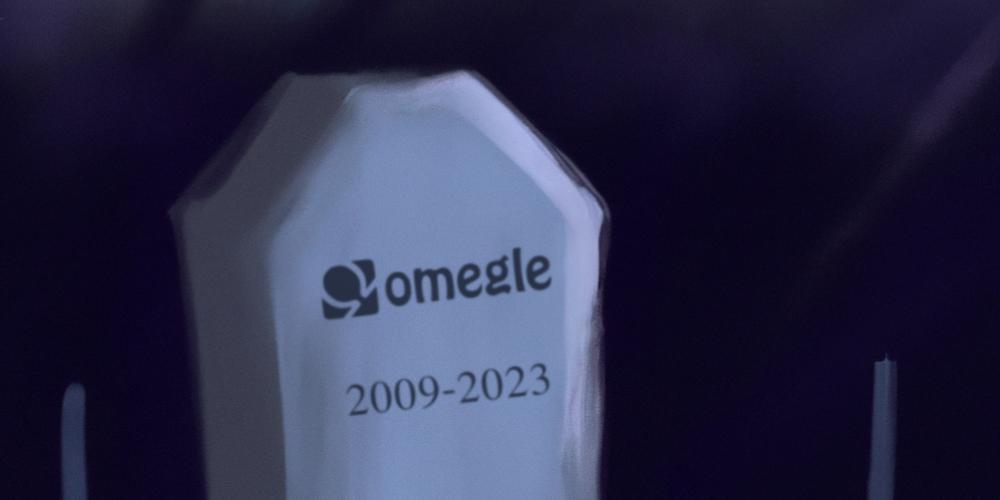Why Omegle Shutdown after 14 Years? Read Reasons of Leif K-Brooks(Founder of Omegle)
After a remarkable 14-year run, Omegle is bidding farewell. Founder Leif K-Brooks shared the news in a heartfelt statement on a Wednesday. In his message, he revealed that the formidable challenges of maintaining the platform and addressing its rampant misuse had become too burdensome, leading to an unsustainable financial and emotional toll that ultimately led to the decision to close Omegle.

Why Omegle Shutdown after 14 Years?
Omegle, the free online chat platform, has officially ceased its operations after a remarkable 14-year journey.
Founder Leif K-Brooks shared this announcement on Thursday, accompanied by a heartfelt explanation regarding the challenges faced due to a “continuous stream of attacks on communication services, including Omegle, by a disruptive subset of users.”
In his words, “I truly wish the circumstances were different, but the relentless stress and financial burden caused by this struggle, combined with the ongoing challenges of running Omegle and battling its misuse, have become overwhelming.”
He further elaborated, “The viability of operating Omegle, both from a financial and psychological perspective, has reached its limit. Frankly, I don’t want to experience a heart attack in my 30s.”
Leif K-Brooks also expressed his gratitude to the individuals who used the platform positively over the past 14 years.
“With all my heart, I want to extend my gratitude to everyone who utilized Omegle for constructive purposes,” he remarked.
“To all those who contributed to the success of the site in any way,” he added, “I regret that I couldn’t continue the fight on your behalf.”
Omegle, which made its debut in 2009, offered users the opportunity to engage with random individuals online. In 2021, popular content creators Mimiyuuuh and Kween Yasmin even used Omegle for caroling in a vlog collaboration.

Tweet Link:- https://twitter.com/PopBase/status/1722423193833713928
Read the Full Statement of Leif k-Brooks (Founder of Omegle)
Statement outline
- Leif K-Brooks’ early fascination with the Internet’s potential for connection and learning.
- The Internet is a refuge from physical harm, providing a sense of safety.
- The launch of Omegle at the age of 18 to create spontaneous social interactions.
- Omegle’s simple concept: random chats with user control and anonymity.
- Omegle’s rapid popularity and growth, serve a fundamental human need.
- Acknowledgment of misuse of the platform for unspeakable crimes.
- Omegle’s commitment to user safety, including moderation and collaboration with authorities.
- The ongoing battle against online crime and the changing world’s challenges.
- Attacks on Omegle due to the actions of a malicious subset of users.
- Welcoming constructive feedback but facing unreasonable demands.
- The shutdown decision was due to insurmountable stress and financial challenges.
- Concerns about the future of the Internet’s nature and user participation.
- A call to support the Electronic Frontier Foundation in defending online rights.
- A heartfelt thank you to Omegle’s users and contributors.
Exploring the Internet’s Wonders
From the very moment I first set foot in the vast realm of the Internet during my early years, it was a world brimming with magic. Growing up in a small, somewhat secluded town, I quickly realized the boundless opportunities it offered. The web introduced me to fascinating people and ideas from around the globe, expanding my horizons in ways I couldn’t have imagined.
Unleashing Curiosity in the Digital World
As a young teenager, the idea of walking onto a college campus and engaging in discussions about moral philosophy or approaching a professor to unravel the mysteries of microeconomics seemed like a dream. However, the Internet allowed me to make these dreams a reality. I embraced it with open arms, becoming an active Wikipedia contributor, participating in open-source software projects, and even helping solve complex computer programming queries, often assisting individuals much older than me.
Haven of Safety in an Uncertain World
For me, the Internet became a sanctuary from a painful past, having survived childhood trauma. In the physical world, every interaction carries the risk of harm. But online, I found solace in the fact that if I declined a conversation or said “no” to someone, there was no physical threat reaching through the screen. The miles of cables and connections acted as a protective shield, allowing me to break free from the isolation enforced by my trauma and fear.
Birthing Omegle – A Vision Realized
At the age of 18, while still living with my parents, I launched Omegle. It was born out of my love for the Internet, with a desire to introduce a form of spontaneous social interaction that I felt was missing. If the Internet is akin to a “global village,” Omegle aimed to be the equivalent of a leisurely stroll down its streets, striking up conversations with the people you encounter.
Prioritizing User Safety
Understanding the innate safety benefits of the Internet, Omegle ensured that users remained anonymous by default. This not only made the conversations more contained but also reduced the chances of a malicious individual tracking someone down after their chat ended.
Humble Beginning and a Swift Rise
When I launched Omegle, I had no idea what to expect. Would anyone even notice a website created by an 18-year-old in his bedroom at his parents’ home in Vermont, devoid of any marketing budget? To my surprise, it gained instant popularity upon its launch and continued to grow organically, attracting millions of daily users. I believe this was because meeting new people is a fundamental human need, and Omegle provided one of the best avenues to fulfill that need.
The Power of the Internet – Both Light and Shadows
Sadly, even in the most virtuous of tools, shadows can emerge. This holds true for communication platforms, given their inherent versatility. The telephone can be used to convey birthday wishes, but it can also be used for malicious purposes, such as bomb threats. It’s impossible to discuss Omegle without acknowledging that, like any communication tool, some individuals misused it, committing unspeakable crimes.
Championing Responsibility and Safety
I strongly believe in the duty to be a “good Samaritan” and to employ reasonable measures to combat crime and misuse. Omegle took this commitment seriously. Beyond the default anonymity, we implemented robust moderation, including cutting-edge AI and a dedicated team of human moderators. Omegle consistently punched above its weight in content moderation, and I take pride in our achievements.
Positive Impact Beyond the Screen
Omegle’s moderation efforts extended beyond the platform itself. We collaborated with law enforcement agencies and organizations like the National Center for Missing and Exploited Children to aid in bringing wrongdoers to justice. As a result, there are individuals behind bars today, thanks in part to the evidence Omegle proactively collected and shared with authorities.
Never-Ending Battle Against Crime
The battle against crime is a relentless one, a fight that must be waged day after day. Even when you do your very best, you may not completely eliminate crime. It’s a harsh reality, but a fundamental lesson in criminology, understood by most.
Challenges in a Changing World
In recent years, the world seems to have grown more contentious. Perhaps it’s the influence of the pandemic or increasing political disagreements. People have become quicker to criticize and slower to recognize each other’s shared humanity. One aspect of this is the continuous assault on communication services, including Omegle, due to the actions of a small group of malicious users.
Navigating the Waters of Constructive Feedback
While it’s reasonable to question the policies and practices of any platform where crimes occur, I’ve always welcomed constructive feedback. Over the years, Omegle implemented numerous improvements based on such feedback. However, recent attacks felt far from constructive. It seemed that the only way to appease these individuals was to cease providing the service altogether.
Real Victims in the Crosshairs
When they say that Omegle shouldn’t exist, they’re essentially saying that you, the users, shouldn’t be allowed to utilize it. This notion is in stark contrast to the ideals I hold dear, particularly the core principle that, when restrictions are imposed to prevent crime, they must not target innocent or potential victims of crime.
Balancing Fear and Freedom
Fear is a powerful tool that can guide us away from danger. Yet, fear can also become a mental cage, limiting us from experiencing the joys of life. Individuals and families should have the freedom to strike the right balance based on their unique circumstances.
Unpredictable Path Ahead
I’ve done my best to weather the storm, always keeping the interests of Omegle’s users and the broader principles in mind. If something as fundamental as meeting new people becomes forbidden, what’s next? That’s a far cry from any reasonable compromise, and it raises concerns about the state of a free society where we become afraid of each other to such an extent.
The End of an Era
Unfortunately, circumstances have led to this decision. The stress and financial burden of the ongoing battle, coupled with the already challenging task of operating Omegle and combating misuse, have become insurmountable. Operating Omegle is no longer sustainable, both financially and psychologically. Frankly, I don’t want to risk a heart attack in my 30s.
The Bigger Battle for the Internet
While the battle for Omegle may have been lost, the broader war against the Internet’s challenges continues. Virtually every online communication service faces similar attacks. I worry that unless the tide turns, the Internet I fell in love with may cease to exist, replaced by a mere evolution of TV, focused primarily on passive consumption with limited opportunities for active participation and genuine human connection. If this prospect concerns you, please consider supporting the Electronic Frontier Foundation, an organization dedicated to defending your rights online.
Heartfelt Thank You
From the depths of my heart, I want to express my gratitude to all who used Omegle for positive purposes and to everyone who contributed to the site’s success in various ways. I am genuinely sorry that I couldn’t continue this fight for you.
FAQ
- Why did Omegle shut down?
- Omegle shut down due to the increasing financial and emotional burden associated with combating misuse on the platform.
- When did Omegle officially close its services?
- Omegle ceased its operations on November 8, 2023, at 7:30 PM EST.
- Was Omegle a victim of cyberattacks?
- While Omegle faced challenges from malicious users, its shutdown was primarily driven by the cumulative stress and financial strain of maintaining the platform.
- What was the key appeal of Omegle to users?
- Omegle allowed users to have random, anonymous conversations with strangers, making it a unique and spontaneous way to meet new people online.
- Were there any safety measures in place on Omegle?
- Omegle implemented safety measures, including user anonymity by default and content moderation involving AI and human moderators to ensure a safer user experience.
- Is there any hope for Omegle’s return in the future?
- The shutdown appears to be permanent, and there are no official indications of a future return.
- What alternatives are available for users who enjoyed Omegle?
- Users can explore other similar online chat platforms that provide opportunities for connecting with strangers.
- How can I support the ideals behind Omegle’s mission?
- Consider donating to the Electronic Frontier Foundation, an organization dedicated to defending online rights.
- Will Omegle’s founder be involved in any other projects?
- There is no information available about the founder’s future projects at this time.
- Is there an official statement from Omegle’s founder regarding the shutdown?
- Yes, the founder released a heartfelt statement explaining the reasons for Omegle’s closure and expressing gratitude to the users.




